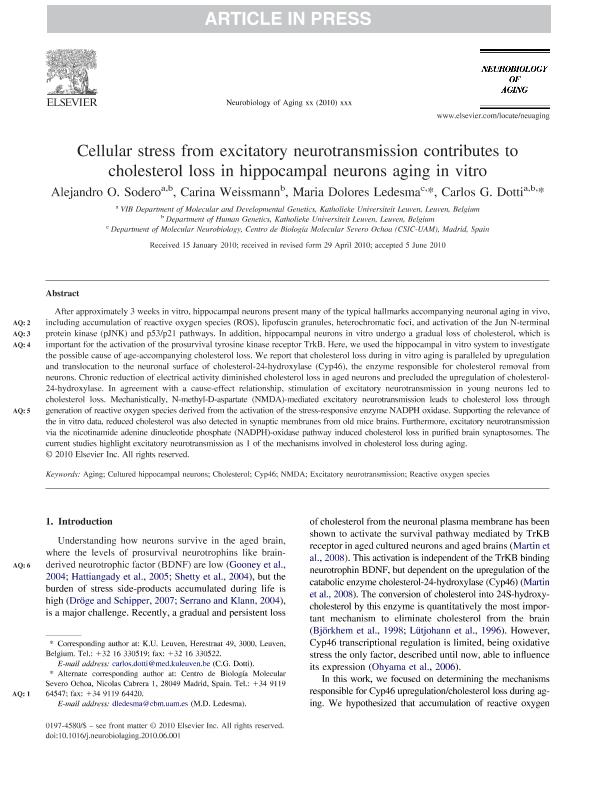Mostrar el registro sencillo del ítem
dc.contributor.author
Sodero, Alejandro Omar
dc.contributor.author
Weissmann, Carina

dc.contributor.author
Ledesma, María Dolores
dc.contributor.author
Dotti, Carlos G.
dc.date.available
2017-07-12T22:13:10Z
dc.date.issued
2011-07
dc.identifier.citation
Sodero, Alejandro Omar; Weissmann, Carina; Ledesma, María Dolores; Dotti, Carlos G.; Cellular stress from excitatory neurotransmission contributes to cholesterol loss in hippocampal neurons aging in vitro; Elsevier Inc; Neurobiology Of Aging; 32; 6; 7-2011; 1043-1053
dc.identifier.issn
0197-4580
dc.identifier.uri
http://hdl.handle.net/11336/20309
dc.description.abstract
After approximately 3 weeks in vitro, hippocampal neurons present many of the typical hallmarks accompanying neuronal aging in vivo, including accumulation of reactive oxygen species (ROS), lipofuscin granules, heterochromatic foci, and activation of the Jun N-terminal protein kinase (pJNK) and p53/p21 pathways. In addition, hippocampal neurons in vitro undergo a gradual loss of cholesterol, which is important for the activation of the prosurvival tyrosine kinase receptor TrkB. Here, we used the hippocampal in vitro system to investigate the possible cause of age-accompanying cholesterol loss. We report that cholesterol loss during in vitro aging is paralleled by upregulation and translocation to the neuronal surface of cholesterol-24-hydroxylase (Cyp46), the enzyme responsible for cholesterol removal from neurons. Chronic reduction of electrical activity diminished cholesterol loss in aged neurons and precluded the upregulation of cholesterol-24-hydroxylase. In agreement with a cause-effect relationship, stimulation of excitatory neurotransmission in young neurons led to cholesterol loss. Mechanistically, N-methyl-D-aspartate (NMDA)-mediated excitatory neurotransmission leads to cholesterol loss through generation of reactive oxygen species derived from the activation of the stress-responsive enzyme NADPH oxidase. Supporting the relevance of the in vitro data, reduced cholesterol was also detected in synaptic membranes from old mice brains. Furthermore, excitatory neurotransmission via the nicotinamide adenine dinucleotide phosphate (NADPH)-oxidase pathway induced cholesterol loss in purified brain synaptosomes. The current studies highlight excitatory neurotransmission as 1 of the mechanisms involved in cholesterol loss during aging.
dc.format
application/pdf
dc.language.iso
eng
dc.publisher
Elsevier Inc

dc.rights
info:eu-repo/semantics/openAccess
dc.rights.uri
https://creativecommons.org/licenses/by-nc-nd/2.5/ar/
dc.subject
Aging
dc.subject
Cultured Hippocampal Neurons
dc.subject
Cholesterol
dc.subject
Cyp46
dc.subject.classification
Bioquímica y Biología Molecular

dc.subject.classification
Medicina Básica

dc.subject.classification
CIENCIAS MÉDICAS Y DE LA SALUD

dc.title
Cellular stress from excitatory neurotransmission contributes to cholesterol loss in hippocampal neurons aging in vitro
dc.type
info:eu-repo/semantics/article
dc.type
info:ar-repo/semantics/artículo
dc.type
info:eu-repo/semantics/publishedVersion
dc.date.updated
2017-07-12T14:52:07Z
dc.journal.volume
32
dc.journal.number
6
dc.journal.pagination
1043-1053
dc.journal.pais
Estados Unidos

dc.description.fil
Fil: Sodero, Alejandro Omar. Katholikie Universiteit Leuven; Bélgica. Consejo Nacional de Investigaciones Científicas y Técnicas; Argentina
dc.description.fil
Fil: Weissmann, Carina. Katholikie Universiteit Leuven; Bélgica. Consejo Nacional de Investigaciones Científicas y Técnicas; Argentina
dc.description.fil
Fil: Ledesma, María Dolores. Centro de Biología Molecular Severo Ochoa; España
dc.description.fil
Fil: Dotti, Carlos G.. Katholikie Universiteit Leuven; Bélgica
dc.journal.title
Neurobiology Of Aging

dc.relation.alternativeid
info:eu-repo/semantics/altIdentifier/doi/http://dx.doi.org/10.1016/j.neurobiolaging.2010.06.001
dc.relation.alternativeid
info:eu-repo/semantics/altIdentifier/url/http://www.sciencedirect.com/science/article/pii/S0197458010002538
Archivos asociados
